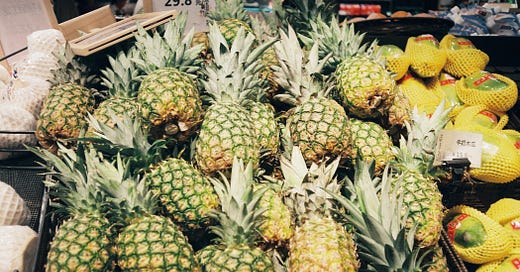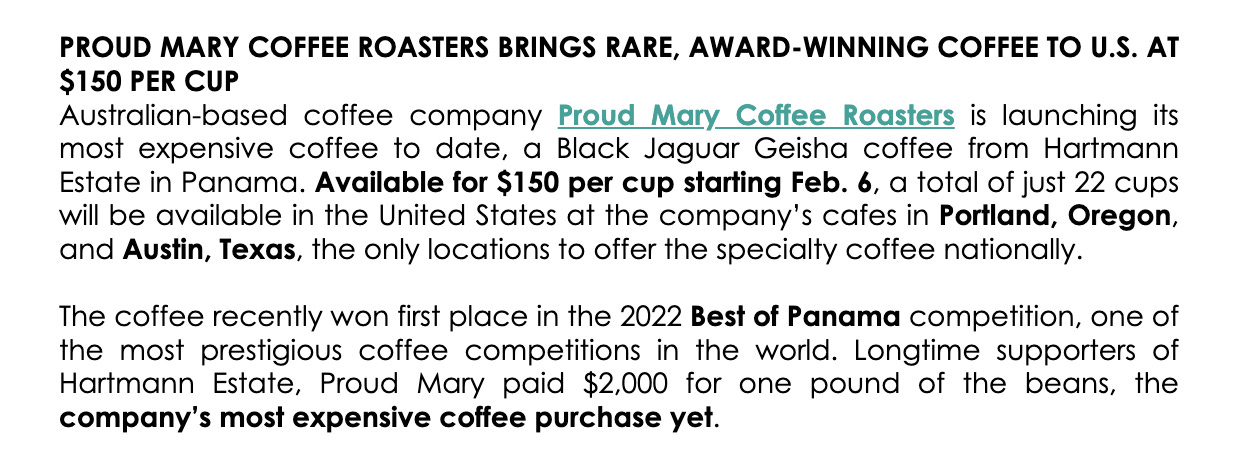Coffee Preferences Aren’t Universal. That’s a Good Thing.
Our tastes are shaped by where and how we’re raised—it shouldn’t be a surprise that our coffee preferences are just as varied
Hello friends! We just passed 100 paid subscribers! Thank you so much for helping me get there. Articles and podcasts will always be free, so please consider switching to a paid subscription if you can to keep the work sustainable.
A few weeks ago, I talked about how my first transformative moment in coffee involved blueberries—or at least, blueberry flavor notes. A couple of other coffee folks mentioned having a similar moment; tasting the unmistakable flavor in an unexpected place kickstarted their interest in coffee. But depending on where you are in the world, your transformative flavor moment might look very different.
During this week’s interview with Namisha Parthasarathy of Ārāmse—a platform that combines a YouTube channel, a coffee subscription service based in India, and a newsletter—we reference two significant pieces that she wrote. The first, written for coffee news outlet Sprudge, is about the South Indian Filter: a brewing device that has yet to receive the specialty coffee treatment given to brewers like the Chemex or the V60, despite its widespread use. Her second story, written for the Specialty Coffee Association’s quarterly publication 25, is about deanonymizing coffee in India.
Both pieces are excellent, and both explore the state of coffee in India. Despite the fact that India is the sixth-largest producer of coffee in the world, many consumers will never knowingly have tried Indian coffee before—as Namisha says, much of it is used in anonymous blends or dark-roasted espressos. She also explores the fact that the flavor descriptors commonly used in coffee are rooted in the experiences of the Global North—and the Western perception that Indian tools and practices are only deemed valuable when they carry some sort of nostalgia or “ancient wisdom.”
In the piece about deanonymizing coffee in India, Namisha talks to Tim Wendelboe about flavor:
Tim Wendelboe, owner of the eponymous roastery, has seen his own flavor preferences, and therefore his customers’ preferences, shift over his career. When we spoke about the history of flavor preferences and the future of Indian coffee in September last year, he noted that, in his experience in Norway, modern tastes for fruity coffees with heightened acidity, like Kenyan and Ethiopian coffees, are “not due to customer demand.” Referring broadly to coffee buyers, he noted: “We kind of collectively changed the preferred flavor in the market.”
What I found so interesting about this passage is how deftly it undermines any idea that preferences in coffee are inherent, and instead posits that taste and preferences are contextual. Wendelboe, who owns a coffee roastery in Norway, is often associated with “Nordic-style” coffee, which employs light roasts to highlight a coffee’s acidity, florality, and fruitiness. You might also see these coffees described as “Scandinavian-style,” and many of the ideas and principles of third-wave coffee come from that area of the world.
When Trish Rothgeb wrote the 2003 article introducing the term “third wave,” she interviewed people like Wendelboe and drew from her experiences visiting coffee shops in Norway, so it rightly stands that many of the ways we consume coffee now come from him and his contemporaries. While Wendelboe is certainly no puppeteer pulling the industry’s strings, a lot of what’s popular now isn’t about consumer demands but rather is communicated to consumers via such tastemakers and experts.
Wendelboe’s comments are both encouraging and revealing, as Namisha explains:
This is, in fact, good news: our collective preferences are always in development; we’re not limited to the prevailing set. But it also highlights a difficult truth: As consumers, we are often unaware of when these shifts happen. How we value certain flavors over others can very much be a function of whose opinion we value, and how stories are told.
Let’s start with the good news: Knowing that preferences evolve means we have more control over the future of coffee than we might think. This might seem obvious, but I’d argue that specialty coffee has conflated quality and flavor for so long that we think only coffees that taste a certain way are “the good ones.”
But if we know preferences evolve, we can begin to give more care and thought to what matters to us when we drink coffee. This gives a lot of hope and opportunity to folks like Namisha and her husband Raghunath, who are trying to combat notions of inferiority that coffees from India have been saddled with for years. It’s an empowering project, and provides an optimistic outlook for the future of coffee as a whole.
The bad news? We really need to think more about who controls the narrative, and how much power and credence we give so-called tastemakers. This isn’t to say influential people within coffee—or any realm—are necessarily bad actors. But if the preferences of a small cohort can dictate how people around the world produce, roast, and brew coffee, it’s worth considering the scale of their influence—and who’s currently left out of those positions of trust and authority. “A common thread across almost all interviewees I spoke with for the purpose of this article was India’s need for more voices marketing and telling the stories of its coffees, therefore driving demand for their unique attributes,” Namisha writes.
But even if we’re looking to tug consumer habits in a new direction, we need to acknowledge that striving for any “best” or “correct” way to have coffee is an unhelpful paradigm. “The bourgeoisie ideal of the artisanal, and the implicit objectivity of flavor that is embedded in these bags and then brewed in standardized ways, makes customers feel like they are paying up for something that is unambiguously excellent,” Namisha points out. As we stated above, quality and flavor are so intertwined at this point that anyone presenting a coffee that tastes slightly out of line with what we’re used to might be facing more of a battle than just challenging perceptions—it’d be an entire challenge to how we understand specialty.
But the good outweighs the bad, and we’re seeing folks take steps to acknowledge that coffee is more than just one set of tastes. Perhaps the most promising sign of this shift is the Specialty Coffee Association’s revision of the definition of “specialty coffee” in 2021. The organization’s new definition describes specialty as “a coffee or coffee experience recognized for its distinctive attributes, and because of these attributes, has significant extra value in the marketplace.”
The tide is changing, and it's exciting to see.
Before You Go…
I published a piece for TASTE about stock, which asked if the ubiquitous base for soups, stews, and other saucy dishes is even necessary. Spoiler alert: It’s not, and there are times when water works just fine.
The Washington Post published an article about coffee pods and argued that they might be more environmentally friendly than regular coffee … which nearly broke my brain. Others in coffee noticed and broke down how patently ridiculous this argument is.
Also, a colleague sent me a press release about a $150 cup of coffee. I took a screenshot:
In his email, he wrote, “Don’t want, NEED the boss barista take on ... whatever this is,” and it made me wonder: What are you DYING to learn more about in coffee? What’s a question you’d like to see tackled here? I’m always open to new topic ideas and inspirations, so don’t hesitate to throw some thoughts my way!
Photo by cin .






Two things - I’m very curious about the expensive Panamanian coffee. And I agree that stock isn’t super important! I regularly cook soups and stews with just water, as I don’t have time to always make my own stock and am allergic to many of the sticks in the market. I also find that water can often take the place of milk and milk substitutes in baking (my water-based pumpkin pie always gets rave reviews compared to the condensed-milk varieties). Sometimes the simplest ingredients make the more complex flavors sing.
Congratulations on 💯 Ashley!